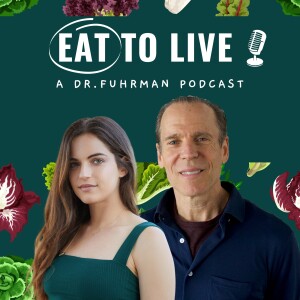Episodes

Wednesday Apr 24, 2024

Tuesday Mar 26, 2024
Tuesday Mar 26, 2024
Welcome back to another insightful episode of the Eat Live podcast. While it's a departure from our usual dynamic with my daughter Jenna, today's episode promises an equally enriching dialogue as I'm joined by a dear friend and esteemed colleague, Matthew Lederman MD. For those unfamiliar, Matt has been deeply entrenched in the realm of plant-based nutrition and lifestyle medicine for decades. However, what sets him apart is his innovative approach, which extends beyond dietary excellence to encompass a holistic view of wellness. Today, we delve into his latest endeavor, "Wellness to Wonderful," a groundbreaking book co-authored with his wife Alona Pulde MD.
Members - skip the ads and watch our podcast episodes at DrFuhrman.com!

Wednesday Feb 28, 2024

Tuesday Jan 30, 2024
Tuesday Jan 30, 2024
Dr. Fuhrman chats with fellow nutritional researcher, Dr. Jay Sutliffe. Jay is a member of the Northern Arizona University Health Sciences. Jay earned his doctorate degree in Public Health from Walden University, his Master’s degree in Health Education from the University of Nebraska, and his Bachelor’s degree in Food and Nutrition / Dietetics from North Dakota State University. Jay is also a Registered Dietitian. Dr. Sutliffe joins Dr. Fuhrman as they conduct research related to: disease prevention and reversal using non-invasive lifestyle practices, wellness across the lifespan, and lifestyle habits of college students. Join them in their awesome conversation.

Monday Dec 18, 2023
Monday Dec 18, 2023
Jenna and Dr. Fuhrman share personal anecdotes and favorite heart-healthy holiday recipes, illustrating how festive meals can be both delicious and nutritious. This episode is a must-listen for anyone looking to enjoy the holiday season without compromising their heart health. It's filled with valuable insights, expert advice, and practical tips to keep you on track with your health goals.
Highlights:
0:00 - Intro
1:45 - Heart health-related risks and concerns for loved ones
5:56 - Limitations and risks of using medication for heart health
10:07 - Challenges in changing diet and lifestyle
17:40 - Cultural significance of food and drink in bonding and celebration
19:29 - Healthy recipes for holiday gatherings
20:19 - Long-term consequences of unhealthy eating habits
21:00 - Alternative ways to bond during holidays
28:02 - Using opportunities for positive influence
32:00 - Role of ego in personal health choices and interactions
36:25 - Dr. Fuhrman's mantra: "The salad is the main dish."

Thursday Nov 02, 2023
Thursday Nov 02, 2023
Amidst the myriad of diets parading as the ultimate solution, it's essential to discern between fleeting trends and genuine health. It's not just about losing weight but also about enriching our lives with quality, longevity, and vitality.
So, instead of being swayed by the latest weight loss pill or diet fad, let's understand the WHY behind our dietary choices with the Eat to Live podcast.

Monday Oct 16, 2023
Monday Oct 16, 2023
Why do some swear by certain diets, boasting remarkable weight loss, while others see minimal results? Let’s unravel the hidden dangers of popular diets! Dive into this revealing exploration as we expose the fads and myths, especially of trending diets like keto.
Discover the underestimated power of plant-based nutrition as a genuine weight loss ally. 🌱 Amidst the allure of popular diets, have we lost sight of true health and longevity? Delve into the secrets that go beyond fleeting weight loss fads, aiming for a life enriched in quality and vitality. Curious about the real weight loss dynamics between plant protein and meat? We offer science-backed revelations that shed light on these dietary fads.
Don't merely chase the weight loss hype; grasp the WHY behind your dietary choices. Embark with us on a journey beyond fad diets to genuine health and lasting weight loss success!

Thursday Sep 07, 2023
Thursday Sep 07, 2023
In a world filled with health trends and diet fads, it's easy to overlook the fundamental building blocks of our well-being. Enter Dr. Joel Fuhrman, who guides us through the critical trio of sunshine, vitamin D, and calcium.
This is not just about catching some rays; it's about embracing a lifestyle that could potentially add years to your life. Dr. Fuhrman shares the science and offers a glimpse into his Nutritarian approach — a philosophy that transcends diet and embodies a holistic way of life.
Have you ever pondered the impact of these three elements on your health? Prepare to be enlightened. Dr. Fuhrman talks about how a balanced intake can bolster your bone health and shield you against various ailments. And that's not all! We also delve into the pivotal role of sleep in our overall well-being.
If you're on a quest to make transformative life adjustments, this episode is your sunshine. Tune in, and let's embark on this enlightening journey together.

Tuesday Aug 01, 2023
Tuesday Aug 01, 2023
Alcohol and health. Two contrasting words that somehow intertwine in our modern society. Where do we draw the line between savoring an occasional glass of wine and wrestling with alcohol’s potential health hazards? How do we strike a balance between being health conscious and obsessing over it? In the latest episode of the Eat to Live Podcast, Jenna and Dr. Joel Fuhrman take us on a fascinating journey exploring these critical topics.

Wednesday Jun 14, 2023
Wednesday Jun 14, 2023
Welcome to today's enlightening discussion on the Eat to Live podcast! Your favorite healthy living duo is here to unveil the truth about salt and its impact on our health. Join Dr. Fuhrman and Jenna as they explore the world of salt and sodium in its various forms and uncover the dangers it poses to our well-being.





